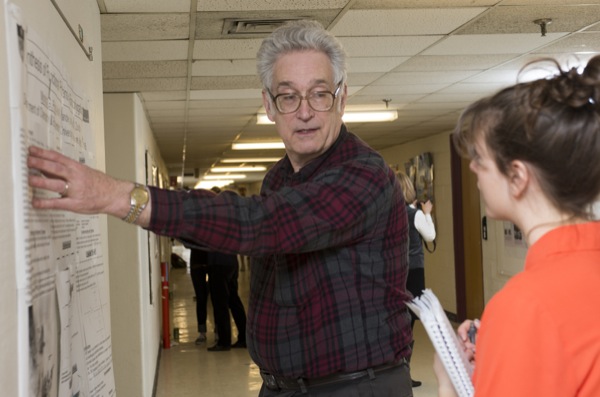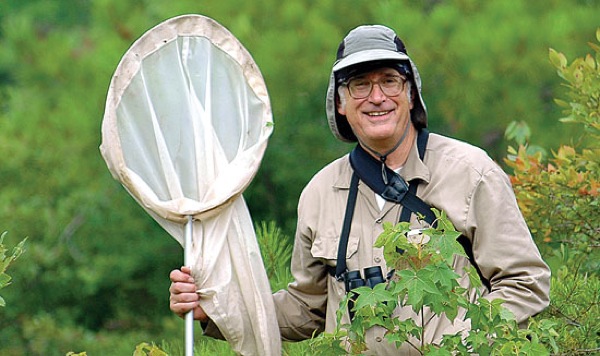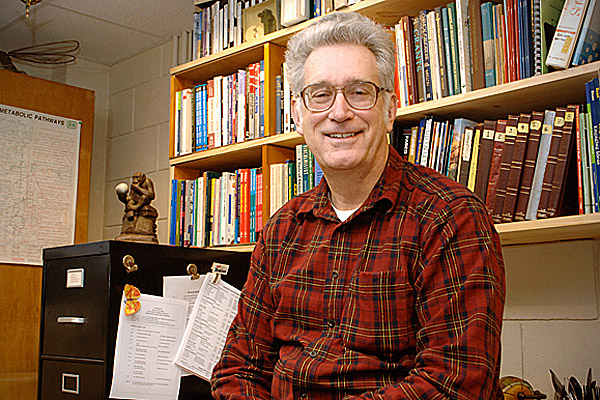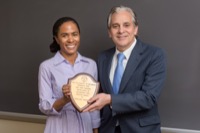Professor of the Year
Lifelong learner Hal White of UD recognized with prestigious award
3:11 p.m., Nov. 14, 2013--Perhaps it’s because he’s never stopped being a student himself.
Hal White, professor of chemistry and biochemistry at the University of Delaware, has been named Delaware’s Professor of the Year by the Council for the Advancement and Support of Education (CASE) and the Carnegie Foundation for the Advancement of Teaching.
Honors Stories
National Medal of Science
Warren Award
The honor, bestowed annually upon the country’s best undergraduate educators, was announced Thursday, Nov. 14, at a luncheon in Washington, D.C.
“I’ve been aware of it for many years and I was excited to be nominated,” White said of the award.
He joins fewer than a dozen Delaware educators to have received this award since its inception in 1981. There is not a guaranteed winner in each state every year since all candidates must meet rigorous criteria.
In White’s office, a golden dragonfly mobile spins from the ceiling. The bike he rides to campus every day sits propped against a filing cabinet. It’s obvious within minutes of spending time with White, an established biochemist, that he is connected to the natural world.
In fact, in 2011 he published a book unrelated to his field, Natural History of Delmarva Dragonflies and Damselflies: Essays of a Lifelong Observer. He has become an expert of the species in the Northeast.
It isn’t the focus of his professional work at UD. Rather, it’s a reflection of a lifelong hobby he traces back to the eventful night that set everything into motion.
As a child, he was catching moths with a net outside a custard stand in central Pennsylvania, oblivious to the world around him. A couple approached him, both entomologists, and invited young White back to their house to see their collection.
His fascination with dragonflies and damselflies, then under-studied insects, was piqued and it turned him into a lifelong student.
He went on to earn a degree in biochemistry from Penn State University and his doctorate in biochemistry from Brandeis University. He continued to study dragonflies on the side while professionally researching vitamin-binding proteins, metabolism and biochemical evolution.
White joined the UD faculty in 1971. He continued to take his work outside of the laboratory, becoming ever more interested in undergraduate education, both at the University and at the national level.
In the early 1990s, funding for his laboratory research waned, but he was awarded a National Science Foundation education grant. It forever changed his career path.
Devotion to teaching “seems like something normal to me, but it's not something every faculty does,” White said. “You get promoted as a researcher; you don't get promoted on your teaching.”
As a scientist, he wasn't trained to be an educator. In graduate school and later, the emphasis for most scientists is on research, grant funding and publication. At the university level, it’s simply expected that someone who understands the subject well can teach it, White said.
“He's had an interesting career because he decided to devote himself to teaching at a certain point,” said Steve Bernhardt, the UD professor of English who nominated White for the award. “That's a tough decision in our environment if you're expected to be a research scientist.”
For the past 16 years, White has been director of the Howard Hughes Medical Institute undergraduate science education program at UD. He is a member of the Education and Professional Development Committee of the American Society for Biochemistry and Molecular Biology (ASBMB) and of UD’s Institute for Transforming Undergraduate Education (ITUE).
He has won numerous teaching awards prior to CASE’s professor of the year and in April 2014 will accept a teaching award from the ASBMB, giving a talk at its annual conference.
“Whenever I have campus visitors I make sure they visit one of Hal's biochemistry classes,” said Bernhardt, who is also director of the ITUE. “He's just an inspiration.”
The two have known each other since Bernhardt came to UD 13 years ago and they began working together on issues in education. White was attending monthly lunches on campus devoted to education. He learned the issues were the same, regardless of whether they were in science or English.
“Students were bored,” White said. “They were just memorizing.”
He sought to change the way students learned. He was on the forefront of an approach known as problem-based learning, where students work to solve a problem and in the process research the subject, learn the material and ask the questions.
“One of my goals is to get students to think more broadly,” White said. “I want to help change their frame of mind.”
On a recent morning, White had just come from teaching both his graduate course and his biochemistry class for non-majors. He still rode his bike in, despite snowy, wet conditions.
His graduate course brings together teaching assistants from biology and chemistry to help them learn to work together in an interdisciplinary way. His method uses relatable issues to teach his undergraduates biochemistry.
That day, he began the class by asking how many had ever gone two days without food. Starvation became his platform for teaching the students about oxidation, ketoacidosis and carbohydrate metabolism.
“I don't think I consciously said, 'I want to be a teacher,' but it was a foregone conclusion,” said White, who comes from a family of educators.
It was easy to get people to write strong letters of support for the nomination, Bernhardt said, especially from White’s former undergraduates. Many of them have gone on to prestigious graduate programs and accomplished careers.
Bernhardt believes White is deserving of the award and that it shows in his students.
“What's remarkable is they really understand — they talk like biochemists,” Bernhardt said. “They understand how to read the literature and how to read and think and talk like a scientist.”
Article by Kelly April Tyrrell













